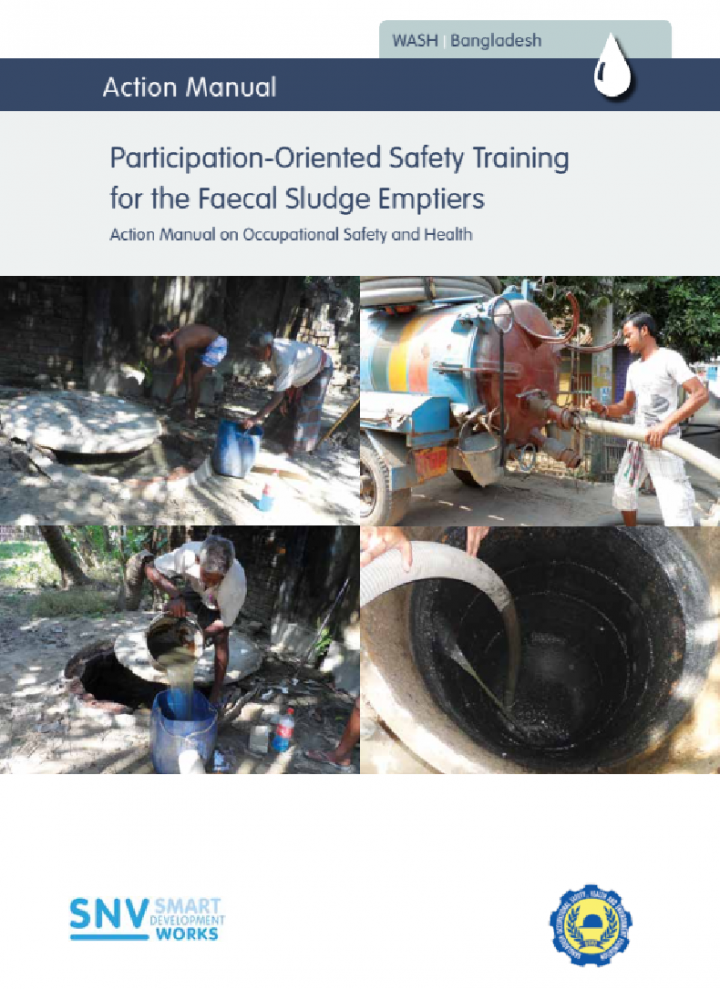Participation-Oriented Safety Training for the Faecal Sludge Emptiers
Repon, A. C., Faruq, O., Mamtaz, R. (2015)

Published in: 2015
Pages: 64
Publisher:
SNV Netherlands Development Organization
Author:
Repon, A. C., Faruq, O., Mamtaz, R.
Uploaded by:
SuSanA Admin
Partner profile:
common upload
1702 Views
27 Downloads
In Bangladesh, the most commonly used sanitation options such as pit-latrines and pour-flush latrine use pits or septic tanks for containing faecal sludge (FS) for a certain period of time which require regular emptying when the tanks or pits become full. This emptying and disposing of faecal sludge is usually performed in a traditional (manual) way by a certain group of people in the society known as “Horijon” or “Sweepers”. Recently, locally innovated technologies (mechanical way) have been introduced by a few city corporations and paurashavas (municipalities) in a more efficient and environmentally sensitive manner.
A large number of faecal sludge emptiers involved in faecal sludge management activities (both manual and mechanical) around the country. Both the manual and mechanical way of emptying, transporting and disposing of faecal sludge is a serious concern from the point of health and safety issues of the workers.
The working processes involved in these operations expose the emptiers to hazardous working conditions. The threat of fatal accident, injury and work related diseases in this occupation are extremely high and require urgent attention to minimize the safety and health risks towards workers and their families who lack financial and social safeguards.
Occupational health and safety measures are fundamental rights of the emptiers and ensuring safer working conditions is a legal accountability of the principal employer or hiring authority along the value chain of faecal sludge management work. Sound safety and health practices at work reduce workers’ vulnerability, increase productivity and lead to an improved protection of the environment.
Thus, the broader objective of the Participation Oriented Safety Training (POST) manual is to support emptiers and employers involved in this field to improve their knowledge of occupational health and safety in both manual and mechanical operations.
The present training manual aims to address the risks involved in faecal sludge handing and emptying operations through the implementation of participation based model. And to provide the skills required to fulfil the role of a field level occupational health and safety (OHS) educator / trainer and increase collective participation between employers and workers in this regard.
This POST training manual is a result of joint efforts of the SNV Netherlands Development Organisation, Bangladesh and OSHE Foundation with a hope that it will serve as an effective instrument on improving working condition and protection of the faecal sludge emptiers in the country.
It is also expected that this training manual contributes towards minimizing work-related risks and health exposures, promotion of good health and safety practices, and development of safe and environment-friendly faecal sludge empting activity through the collective efforts of relevant authorities, employers and emptiers.
Bibliographic information
Repon, A. C., Faruq, O., Mamtaz, R. (2015). Participation-Oriented Safety Training for the Faecal Sludge Emptiers. SNV Netherlands Development Organization
Filter tags
Case studies in other formats East Asia & Pacific English Faecal sludge treatment processes Faeces or faecal sludge Greywater or wastewater Import to Sanitation Workers Platform Peri-urban Urban (entire city)














